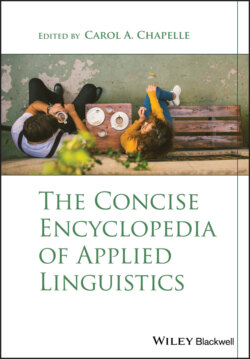Читать книгу The Concise Encyclopedia of Applied Linguistics - Carol A. Chapelle - Страница 231
Bilingualism and Executive Control
ОглавлениеSince Peal and Lambert's (1962) seminal investigation, detailed knowledge has been gathered about aspects of cognition in which bilinguals can excel, such as in executive control (also called “attention control” or “cognitive control”). When bilinguals use one of their languages, the other language is simultaneously active as well. In order to select the targeted language, “language control” must be exerted, that is, the contextually inappropriate language must be suppressed or ignored and the contextually appropriate language must be selectively attended to. It is generally assumed that language control is effectuated by more general processes and mechanisms of executive control, which take care of the control of action in general. If true, the requirement to incessantly control their two languages may boost bilinguals' ability to exert executive control in general and, consequently, bilinguals should be better than monolinguals when they perform nonverbal tasks that require executive control.
This hypothesis has been confirmed in many studies (see Bialystok, Craik, Green, & Gollan, 2009, for a review). There is even evidence to suggest that this bilingual advantage can protect lifelong bilinguals against the onset of Alzheimer's disease, plausibly by contributing to cognitive reserve (Craik, Bialystok, & Freedman, 2010). That domain‐general control mechanisms regulate language control is also suggested by the finding that bilingual experience induces changes in structure and function of the brain regions responsible for executive control (e.g., Abutalebi et al., 2012). Recently, however, the view that bilingualism fosters executive control has come under attack because of the increasing number of studies demonstrating similar behavior of monolinguals and bilinguals in many tasks that are thought to index executive function (e.g., Paap & Greenberg, 2013; Valian, 2015). A plausible reason for the inconsistent results across studies is the large variability among both the bilingual populations tested and the tasks used to index executive function. Possibly, the advantageous effect of bilingualism on executive function only applies to specific bilingual populations (e.g., lifelong bilinguals using both languages each day, both actively and passively) and to specific aspects of executive functioning.
Bilingualism has become an omnipresent phenomenon in the modern world and it may not take long before monolingual speakers can hardly be found anymore. It is a promissory side‐effect of a development toward bilingualism as the norm that, in the process, a human's average cognitive skills may be lifted—as is suggested by the current research on the relation between bilingualism and nonverbal cognition.
SEE ALSO: Crosslinguistic Influence in Second Language Acquisition; Early Bilingualism; Multicompetence; Multilingualism and Metalinguistic Awareness
